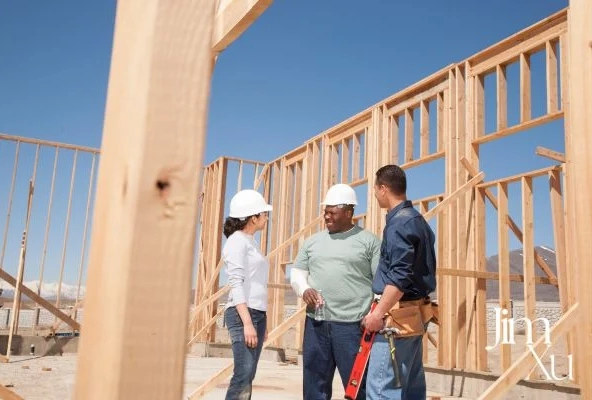Buying a home is one of the most significant financial decisions you’ll make in your lifetime. Understanding the home buying process in Canada is crucial to making informed decisions and avoiding common pitfalls. Whether you’re a first-time home buyer or looking to upgrade, having a clear roadmap can make the journey smoother and more enjoyable.
This guide will provide a comprehensive overview of how to buy a home in Canada. We will walk you through the essential steps to buy a house in Canada, from understanding the real estate market to finalizing your purchase. Along the way, we’ll offer valuable tips on how to buy property in Canada to help you navigate the process with confidence. Whether you’re interested in the specifics of mortgage pre-approval, finding the right home, or understanding the closing process, this guide has you covered.
The Canadian Real Estate Market effects on buying house in Canada
Buying a house in Canada needs information about Real estates and trends in Canada because your knowledge about trends and regions will helps you to find your ideal home . Here are some useful information about Canadian real estates:
Current Trends
The Canadian real estate market has seen significant changes in recent years. Currently, several trends are shaping the market:
- Rising Home Prices: In many parts of Canada, home prices have been steadily increasing. This is especially true in major cities like Toronto and Vancouver, where demand often outstrips supply.
- Low Interest Rates: Historically low interest rates have made borrowing more affordable, encouraging more people to enter the market.
- Urbanization: There’s a growing trend towards urban living, with more people moving to cities for better job opportunities and amenities. This has increased demand for housing in urban areas.
- Remote Work Influence: The rise of remote work due to the COVID-19 pandemic has led to increased interest in suburban and rural properties, as people seek more space and a better quality of life outside of city centers.

Read more: How to negotiate a house price in Canada
Regional Differences
The Canadian real estate market can vary significantly across different provinces and cities. Here’s a look at some of the regional differences:
- Toronto: As Canada’s largest city, Toronto’s real estate market is highly competitive, with high demand and soaring prices. Condos are particularly popular among buyers.
- Vancouver: Known for its beautiful scenery and mild climate, Vancouver also has one of the most expensive real estate markets in the country. Detached homes are in high demand.
- Montreal: Montreal offers a more affordable alternative to Toronto and Vancouver, with a diverse housing market that includes a mix of historic homes and modern condos.
- Calgary and Edmonton: These cities in Alberta have more affordable housing markets, with a good supply of detached homes and a relatively lower cost of living.
- Atlantic Canada: Provinces like Nova Scotia and New Brunswick offer more affordable housing options and are seeing increased interest from buyers looking for a quieter lifestyle and lower prices.
Understanding these trends and regional differences is essential when considering how to buy a home in Canada. Each market has its own unique characteristics, which can significantly impact your process to buy a house in Canada.
Read More: Best neighborhoods in New Westminster
Preparing to Buy a Home in Canada
To be prepared for buying a house process in Canada you have to do these tips:
Financial Preparation
Setting a realistic budget is one of the most critical steps in the buying a home in Canada guide. A well-defined budget helps you understand how much you can afford and prevents you from overextending financially. When budgeting, consider all associated costs, not just the purchase price of the home. These costs include:
- Down Payment: Typically 5% to 20% of the home’s purchase price.
- Closing Costs: Legal fees, home inspection fees, property transfer taxes, and other administrative costs, which can add up to 1.5% to 4% of the home’s purchase price.
- Moving Expenses: Costs related to moving your belongings to the new home.
- Ongoing Costs: Monthly mortgage payments, property taxes, home insurance, utilities, and maintenance.
By accounting for these expenses, you can set a realistic budget that ensures you are financially prepared for homeownership.
Improving Credit Score
Your credit score plays a significant role in obtaining a mortgage. Lenders use your credit score to assess your creditworthiness and determine the interest rate and terms of your mortgage. A higher credit score typically means better mortgage rates and terms. Here are some tips to improve or maintain your credit score:
- Pay Bills on Time: Consistently paying your bills on time has a positive impact on your credit score.
- Reduce Debt: Lowering your debt levels can improve your credit score and make you more attractive to lenders.
- Check Your Credit Report: Regularly review your credit report for errors and correct any inaccuracies promptly.

Mortgage Pre Approval
Getting pre-approved for a mortgage is a crucial step in the process of buying house in Canada. Mortgage pre-approval gives you a clear idea of how much you can borrow, which helps you narrow down your home search to properties within your budget. Additionally, having a pre-approval letter shows sellers that you are a serious buyer, which can give you an edge in competitive markets.
Process
Here are the steps to get pre approved for a mortgage:
- Check Your Credit Score: Ensure your credit score is in good shape before applying for pre-approval.
- Gather Financial Documents: Collect necessary documents such as proof of income (pay stubs, tax returns), bank statements, and identification.
- Choose a Lender: Research and choose a lender that offers competitive mortgage rates and terms.
- Submit an Application: Fill out the mortgage pre-approval application with your chosen lender, providing all required documents.
- Receive Pre-Approval: If approved, the lender will provide a pre-approval letter indicating the maximum loan amount you qualify for and the interest rate.
By following these steps, you can obtain mortgage pre-approval, giving you confidence and clarity as you navigate the home buying process.
Read more: Gentrification in Canadian cities
8 Tips as a Canadian home buyers guide
How to purchase a home in Canada? Start with these tips:
1. Use all the Resources
When searching for a home in Canada, online listings are an invaluable resource. These websites provide detailed information about available properties, including photos, descriptions, and pricing. Here are some popular websites and resources for house hunting:
- Realtor.ca: The official website of the Canadian Real Estate Association (CREA), offering comprehensive listings across Canada.
- MLS.ca: Provides access to the Multiple Listing Service (MLS), where you can find a wide range of properties listed by real estate agents.
- Zillow.ca: Features listings, market data, and useful tools for buyers.
- HouseSigma: Offers detailed market analysis and property valuation for more informed decisions.
Using these websites, you can filter searches based on your preferences, such as location, price range, and property type, making your house hunting more efficient.
Read more: Advantages of owning a home
2. Work with a Real Estate Agent
How to buy a house in Canada? Hiring a professional real estate agent can greatly enhance your home buying experience in Canada. Here are some benefits of working with a real estate agent:
- Expertise: Agents have extensive knowledge of the local market and can provide valuable insights into neighborhoods, pricing, and trends.
- Access to Listings: Agents have access to the MLS and other exclusive listings, giving you more options to choose from.
- Negotiation Skills: Experienced agents can negotiate on your behalf to get the best possible deal.
- Paperwork and Legalities: Agents handle the complex paperwork and legal aspects of the transaction, ensuring everything is done correctly and efficiently.
By leveraging their expertise and resources, a real estate agent can help you find the right home more quickly and with less stress.

Also see: Single family home in Vancouver For Sale
3. What to Look For when Viewing Homes
When viewing homes, it’s important to be thorough and pay attention to key details. Here’s a checklist of things to consider during home viewings:
- Overall Condition: Look for signs of wear and tear, such as cracks in walls, leaks, or outdated fixtures.
- Layout and Space: Ensure the layout and size of the rooms meet your needs and preferences.
- Natural Light: Check the amount of natural light in each room, as this can significantly affect the living environment.
- Storage Space: Evaluate the storage options, including closets, cabinets, and any additional storage areas.
- Kitchen and Bathrooms: Inspect the condition and functionality of the kitchen and bathrooms, as these are often the most used areas of the home.
- Outdoor Space: If applicable, examine the yard, garden, or balcony to ensure it meets your expectations.
- Neighborhood: Take note of the surrounding area, including proximity to amenities, schools, and public transportation. Visit at different times of the day to get a sense of the neighborhood’s character.
By keeping these factors in mind, you can make a more informed decision and choose a home that suits your needs and lifestyle.
Also see: Duplex for sale Richmond bc
4. Making an Offer
When you find the right home and are ready to make an offer, it’s essential to understand the key components of a purchase offer. Here are the essential elements:
- Purchase Price: The amount you are willing to pay for the home.
- Deposit: A sum of money submitted with your offer as a sign of good faith, typically held in escrow until the deal closes.
- Conditions: Contingencies that must be met for the sale to proceed, such as financing approval, home inspection, or sale of the buyer’s current home.
- Inclusions and Exclusions: Items that are included in the sale, such as appliances, fixtures, or furniture, and those that are excluded.
- Closing Date: The proposed date for completing the transaction and taking possession of the property.
- Offer Expiry: The timeframe within which the seller must respond to your offer, after which it becomes void.
5. Negotiation Tips
Successfully negotiating the best price and terms requires preparation and strategy. Here are some tips:
- Do Your Research: Understand the local market conditions and recent sale prices of comparable homes to determine a fair offer price.
- Stay Within Budget: Ensure that your offer is within your budget and pre-approved mortgage amount.
- Be Prepared to Compromise: Be flexible with terms like closing dates or inclusions to make your offer more attractive to the seller.
- Show Serious Intent: A higher deposit can demonstrate your commitment and seriousness as a buyer.
- Include a Personal Touch: A personal letter to the seller explaining why you love the home can sometimes make a difference, especially in competitive markets.
- Use an Escalation Clause: If allowed, an escalation clause can automatically increase your offer in response to competing bids, up to a specified limit.
- Work with Your Agent: Leverage your real estate agent’s expertise to guide you through the negotiation process and advise on the best strategies.
By understanding the components of a purchase offer and employing effective negotiation strategies, you can increase your chances of securing the home at a fair price.
Read more: What is an eco-friendly house

Also see: Apartment in Richmond for sale
6. Home Inspection
A home inspection is a critical step in the home buying process Canada. It provides an objective evaluation of the property’s condition, helping you identify any potential issues that may require repair or could affect the home’s value. An inspection can save you from costly surprises after you move in and can also be a powerful negotiating tool if significant problems are discovered.
What to Expect
During a home inspection, a qualified inspector will thoroughly examine the property, including:
- Structural Elements: Inspecting the foundation, walls, roof, and overall structural integrity.
- Electrical Systems: Checking the electrical panel, wiring, and outlets for safety and functionality.
- Plumbing: Assessing the condition of pipes, water heaters, and fixtures.
- HVAC Systems: Evaluating the heating, ventilation, and air conditioning systems.
- Interior and Exterior: Examining doors, windows, floors, ceilings, and exterior surfaces for any damage or wear.
- Attic and Basement: Looking for signs of moisture, mold, and adequate insulation.
- After the inspection, you will receive a detailed report outlining the findings, including any recommended repairs or maintenance issues. This report can be used to negotiate with the seller for repairs or price adjustments.
7. Closing Process: Legal Steps
The closing process involves several legal steps to finalize the purchase of your home:
- Review the Purchase Agreement: Carefully review the terms and conditions of the purchase agreement, ensuring all contingencies are met.
- Title Search and Insurance: A title search is conducted to verify the property’s ownership history and ensure there are no liens or disputes. Title insurance is also obtained to protect against any future claims.
- Hire a Real Estate Lawyer: In many parts of Canada, a real estate lawyer is required to handle the legal aspects of the transaction, including preparing and reviewing documents, and ensuring compliance with local laws.
- Sign Closing Documents: You will sign various documents, including the deed, mortgage agreement, and any other required paperwork.
- Transfer of Ownership: Once all documents are signed and funds are transferred, the property’s ownership will be officially transferred to you.
8. Finalizing the Mortgage
Finalizing the mortgage is the last step process of purchasing a home in Canada:
- Confirm Loan Details: Review the final loan agreement, ensuring the terms match what was previously agreed upon during pre-approval.
- Arrange for Funds Transfer: Your lender will coordinate with your lawyer to transfer the mortgage funds to the seller’s account.
- Obtain Home Insurance: Most lenders require proof of home insurance before finalizing the mortgage. Ensure you have a policy in place that covers your new property.
- Closing Costs Payment: Be prepared to pay closing costs, which may include legal fees, title insurance, and property transfer taxes.
After these steps are completed, you will receive the keys to your new home, officially completing the transaction.
Read more: Credit Score to Buy a House in Canada
Conclusion
Being well prepared and informed is crucial when buying a home in Canada. Understanding the market, knowing your financial limits, and being aware of the steps involved can help you make confident and informed decisions. This preparation not only helps you find the right home but also ensures a smoother and more enjoyable home buying experience.
FAQs
1. What are the first steps in buying a home in Canada?
The first steps include determining your budget, getting pre-approved for a mortgage, and researching neighborhoods. Understanding what you can afford and choosing the right location are essential for a successful home purchase in Canada.
2. What is the minimum down payment for buying a house in Canada?
In Canada, the minimum down payment depends on the price of the home. For homes under $500,000, the minimum down payment is 5%. For homes priced above that, the down payment is 10% on the portion above $500,000.
3. How do I secure financing for buying a home in Canada?
To secure financing, you’ll need to get pre-approved for a mortgage from a lender or financial institution. Factors such as your credit score, income, and employment history will influence the mortgage terms and the amount you can borrow.
4. What are closing costs when buying a home in Canada?
Closing costs typically include legal fees, home inspection fees, land transfer taxes, and insurance. These costs vary by province, so it’s important to budget for them in addition to your down payment.






